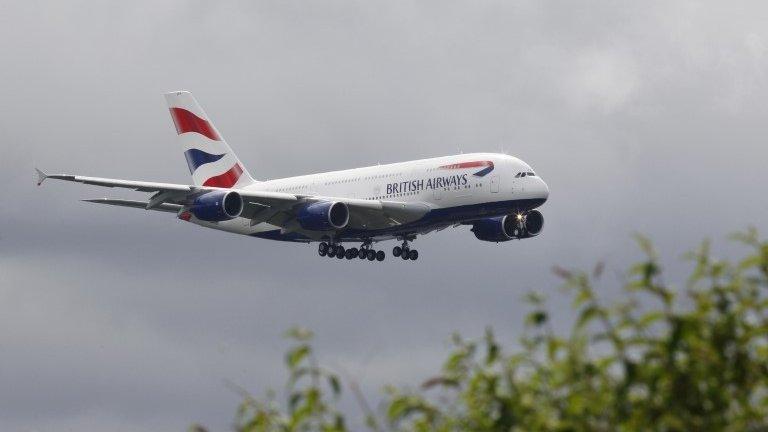Are we seeing the end of the era for the 'super-jumbo'?
- Published
The end of the jumbo?
Last year not a single airline placed an order for the world's two biggest commercial jets, the Boeing 747-8 and the double-decker Airbus A380.
At first sight it would seem that the future should belong to those big four-engined airliners, especially as the number of us travelling by air is expected to soar in the next 20 years.
Indeed only last week, the airline Emirates placed a huge order for new engines for its growing fleet of Airbus A380s.
So what has happened to the air travel market, and why is it that world's major airlines aren't buying these big jets in large numbers anymore?
When the Airbus and Boeing first looked at designing these new jets, Boeing's original four-engined 747 jumbo jet ruled the skies. Airlines everywhere used it on long-haul routes, and kept their smaller twin-engined airliners for shorter flights.
It was logical to assume the future would be dominated by similar large planes capable of carrying up to 500 or more passengers.
It hasn't worked out like that.
Basically, twin-engined planes improved. They became able to fly farther and were more fuel-efficient than their four-engined competitors. Recently, high oil prices and the global economic downturn have hit the industry hard.
Many carriers went out of business and those that survived found their profitability was marginal. The industry is still grappling with the after-effects of the recession.
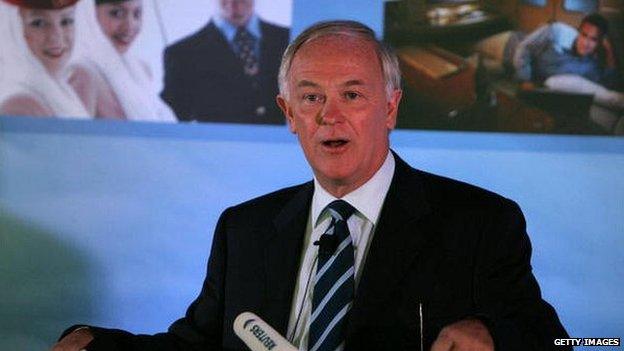
More of us will be travelling in future, which means more airports or bigger planes, says Emirates' Tim Clark
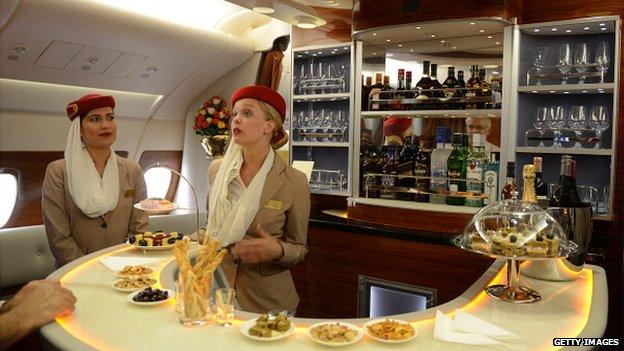
His airline says it has no trouble selling seats on its A380s
'Too big, too thirsty'
Tim Clark, the chief executive of Emirates, who is one of the A380's biggest fans and has ordered 140 of them, external says: "There is a degree of risk-averseness on the board of many carriers today.
"They are concerned about the price of this aeroplane, its operation, being able to fill the aeroplane."
The main use for the A380 is on busy routes or into crowded airports like London's Heathrow where landing slots are at a premium, and the only way of flying in more passengers is to use bigger planes.
However, for most of the world's airports, landing slots are not an issue.
"In the rest of the world, a twin-engined aircraft is enough," says Tom Whitty, chief executive of UK-based remarketing company Cabot Aviation, which sells and leases second-hand aircraft around the globe.
"Very large four-engined aircraft are going out of fashion, unless you are a national flag-carrier like British Airways or Emirates."
"Certainly in the used-market, they are too big and too thirsty in fuel."
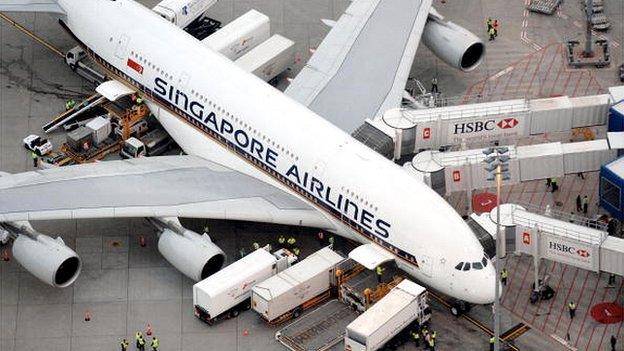
Singapore Airlines was the first carrier to operate the A380
Future questioned
One of the challenges is the time it takes to get an aircraft from the drawing board to an airport departure gate.
It was back in 1990 at the Farnborough Air Show that Airbus officially announced its plan to build a very large airliner.
But it was only in April 2005 that the prototype A380 first flew and not until October 2007 that the first production models entered commercial service with Singapore Airlines.
The time lag between initial development and commercial use means firms like Boeing or Airbus have to work out what the market will be like in 20 or so years, with all the inevitable uncertainty that brings.
While both companies have order backlogs that will sustain production for a few years, they both face tough choices if new orders do not come through.
Significantly, no passenger airline placed orders for either the Boeing 747-8, external or the Airbus 380 last year.
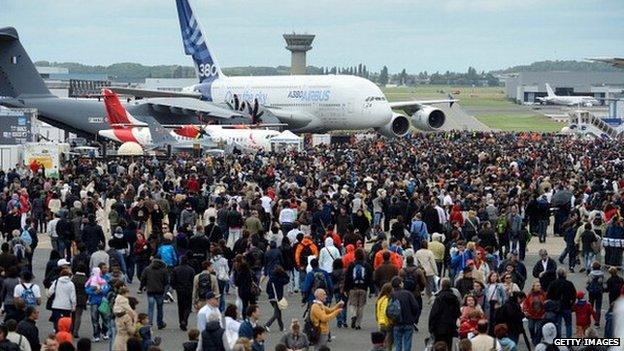
The A380 draws the crowds but has not yet won as many customers as originally hoped
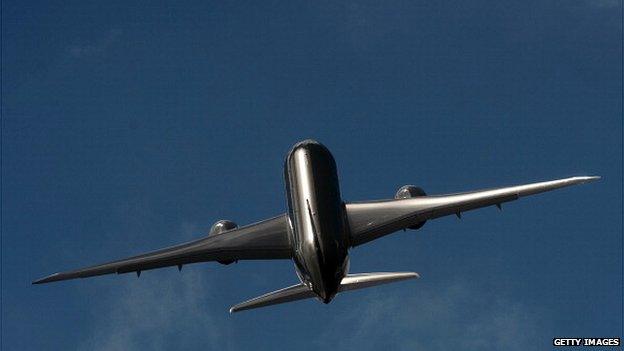
Many airlines now prefer to use more fuel-efficient twin-engined jets
Last December, Airbus chief financial officer Harald Wilhelm raised the prospect of ending production of the A380 - causing consternation among its customers.
While the company swiftly stepped in to reconfirm its commitment, and said it might even replace the plane's engines with more fuel-efficient versions - the furore did the big plane no favours.
Slower sales
So far it has sold 317 A380s, external - but this is just a quarter of the 1,200 'super jumbos' that Airbus forecast that airlines would need when it started marketing the plane.
This is also the first year that Airbus has been able to sell its planes for more than it costs to build them.
But this doesn't take into account the $25bn (£16bn) the company spent on developing it in the first place, and some wonder whether Airbus will ever recover these costs.
For its part, Airbus insists that its jet is "more than ever meeting passengers' changing expectations and matching the evolving trends in air traffic, while generating significant revenue for its operators".
One reason the plane has not sold as had been hoped is that many carriers worry that they would not be able to fill the A380 on many routes.
It is not an argument that Tim Clark of Emirates accepts, saying his competitors could emulate his own carrier's success.
"We fill our aeroplanes because of the way we design the interiors, the amount of money we spend on the brand, and [in] getting the job done."
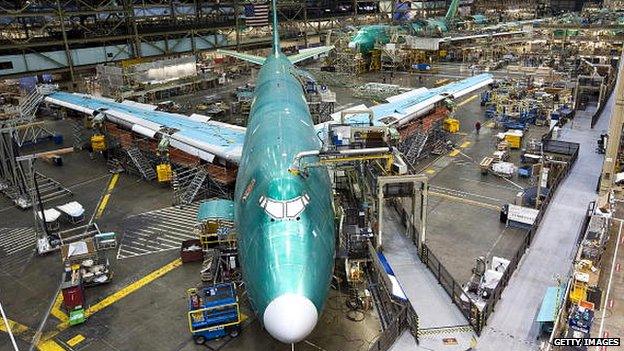
Boeing has sold relatively few of its 747-8s - the majority for the air freight market
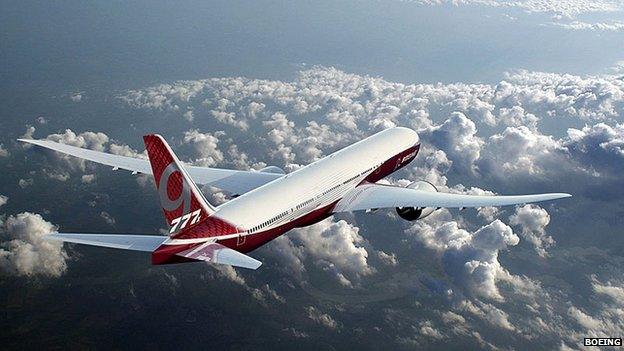
The company is now concentrating on its latest twin-engined jets like the 777X
'Survival plan'
Boeing's big jet, the 747-8 has sold in even fewer numbers. So far just 122 have been ordered - mainly the air freighter version.
However, unlike Airbus, Boeing did not spend as much because it avoided developing an entirely new aircraft. As its name suggests this is an updated version of the original 747.
"In some respects Boeing called it right as they didn't spend $10-15bn to compete with the A380," says Max Kingsley-Jones, of aviation specialists, Flightglobal.
"The 747-8 cost a lot but not as much as a new aircraft would have done."
Unlike Airbus, Boeing sees its future in twin-engined jets like the 777-300ER and the the 777X, external, which can carry between 360-400 passengers. So far it has taken more than 1,000 orders, external for these planes.
"They have a survival plan," says Max Kingsley-Jones, "these planes are both bigger than today's 777. The 777-X has a composite wing and new engines - that is the ultimate replacement in the 777 line-up."
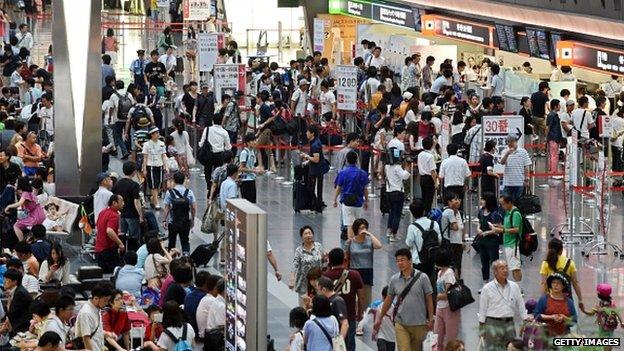
Airlines are likely to have to deal with more than 7 billion passengers a year by 2034
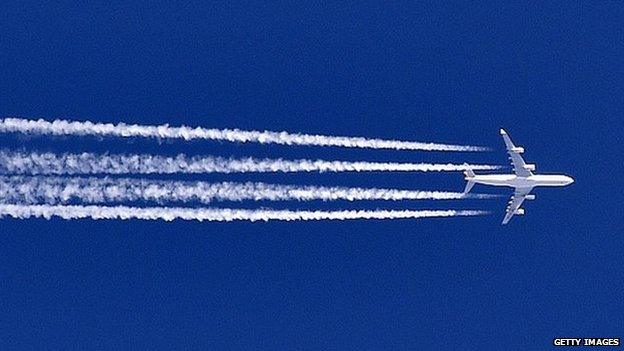
But big four-engined 'super jumbos' like the A380 or Boeing 747-8 could end up serving just a few, key routes
'Running out of sky'
So could Airbus really walk away from a plane in which it has invested so much time, money and prestige?
"They've got it and they've got to make a success of it - it's a challenge," says Flightglobal's Max Kingsley-Jones.
To admit defeat and to close down the A380 production line at this stage "would be a huge loss of face for Airbus," he says.
Air travel is set to more than double from today's 3.3 billion passengers a year to 7.3 billion by 2034, says the International Air Transport Association, external, so "you're going to run out of sky if you keep on putting smaller aeroplanes up there," he adds
Back at Emirates, Tim Clark says that impact of lower oil prices and a global economy that is now showing signs of growth, will mean a bigger market for the plane.
"The future of the very large super-heavy jet, the A380, is assured," he says.
"But at the moment a lot of people are worried about it."
- Published22 April 2015
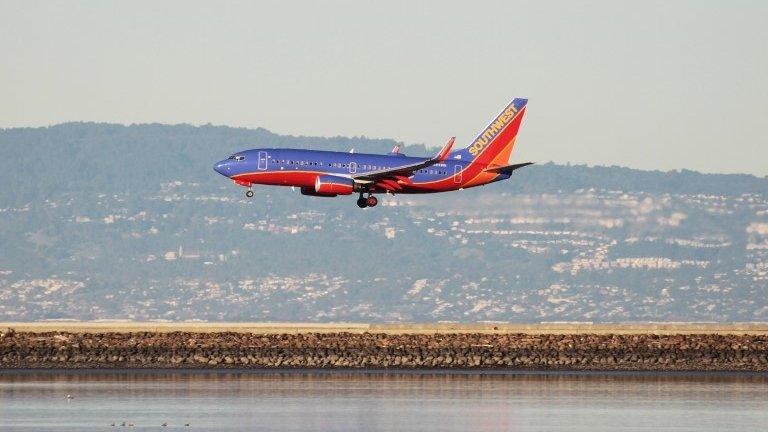
- Published17 April 2015
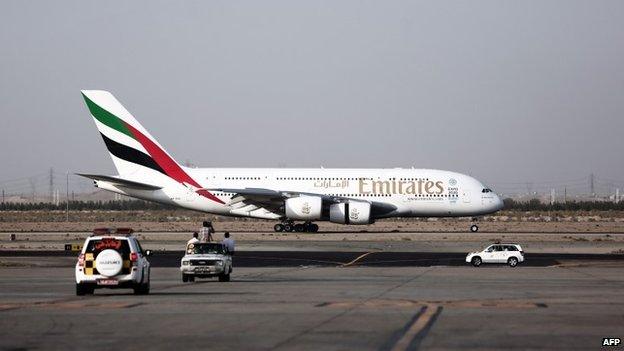
- Published11 December 2014
